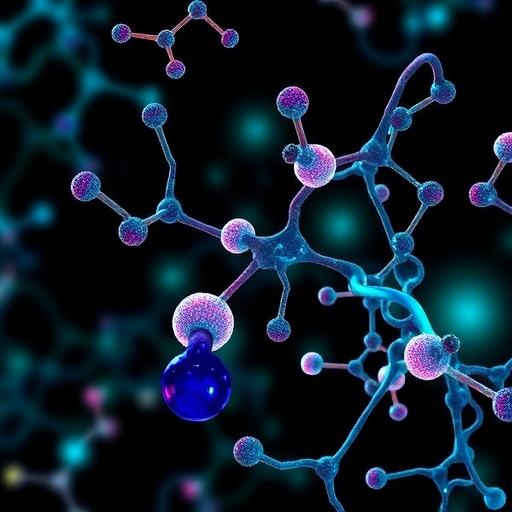In the ever-evolving landscape of cancer treatment, researchers are consistently pursuing innovative strategies to combat this multifaceted disease. One of the promising avenues currently being explored is the identification of novel inhibitors for dihydroorotate dehydrogenase (DHODH), an enzyme critical to the de novo synthesis pathway of pyrimidines. Researchers Rajamohamed and Veerappapillai have embarked on a groundbreaking journey to unveil potential DHODH inhibitors through a computational drug repurposing strategy, representing a pivotal shift in the way we approach cancer therapeutics.
Dihydroorotate dehydrogenase has garnered considerable attention in recent years due to its significant role in the metabolism of nucleotides, which are essential building blocks for RNA and DNA synthesis. The enzyme’s inhibition could effectively disrupt the rapid proliferation of cancer cells, offering a targeted approach that minimizes damage to healthy tissues—a notable advancement considering the severe side effects associated with traditional chemotherapeutics. As such, the research conducted by Rajamohamed and Veerappapillai addresses a critical need in oncology: the development of more effective and less toxic cancer treatments.
The computational drug repurposing strategy employed in this research embodies a transformative methodology within chemical biology. By utilizing existing drugs that have been FDA-approved for other indications, researchers can significantly streamline the drug discovery process, potentially saving substantial time and resources when compared to traditional drug development. This not only accelerates the timeline for therapeutic application but also provides a safety profile for selected compounds, which would otherwise necessitate extensive preliminary testing.
In their study, the researchers meticulously screened a comprehensive library of compounds against DHODH, employing sophisticated computational modeling to predict binding affinities and interactions. This high-throughput virtual screening offers a dynamic approach to pharmacological discovery, making it possible to identify potent inhibitors that may have been overlooked in conventional drug discovery efforts. The results from this computational analysis pave the way for a targeted synthesis of candidates for subsequent laboratory validation.
Upon identifying promising compounds, the next step involves synthesizing these identified inhibitors and conducting in vitro assays to ascertain their efficacy against various cancer cell lines. This experimental phase is crucial as it bridges the gap between computational predictions and practical application. The use of cancer cell lines that accurately replicate the tumor microenvironment can provide invaluable insights into the biological behavior of these compounds, helping to evaluate their potential as viable therapeutic agents.
Moreover, in the quest to combat cancer, the relevance of combinatorial therapies continues to gain momentum. Through the collaborative synergy of DHODH inhibitors with existing chemotherapeutics or immunotherapies, researchers can explore the potential to enhance treatment efficacy while minimizing resistance. This multifaceted approach may not only improve patient outcomes but also establish a robust therapeutic arsenal against the diverse biology of tumors.
In addition to efficacy, understanding the pharmacokinetics and pharmacodynamics of the identified inhibitors is of utmost importance. This entails an examination of the absorption, distribution, metabolism, and excretion (ADME) characteristics, which directly influence the compound’s therapeutic profile. By meticulously analyzing these parameters, researchers can optimize dosage regimens that ensure maximum efficacy while mitigating adverse effects, aligning with the overarching goal of personalized medicine.
The rise of computational methods in drug discovery symbolizes a paradigm shift in the pharmaceutical industry. The integration of artificial intelligence and machine learning into this realm introduces an unprecedented capability to predict molecular interactions and optimize lead compounds. As computational power continues to advance, the prospect of more refined models promises heightened success rates in therapeutic discovery, revolutionizing how we approach complex diseases like cancer.
The implications of successfully identifying and developing new DHODH inhibitors extend beyond the confines of oncology. Should these compounds demonstrate a favorable safety and efficacy profile, they could potentially serve as a template for treating a myriad of conditions that involve aberrant nucleotide metabolism. This versatility underscores the importance of continued research into enzyme inhibitors as a multifactorial strategy that not only addresses cancer but may also impact other metabolic disorders.
As the research progresses, the collaboration between computational biologists and experimentalists will be crucial in refining and advancing these findings. The integration of multidisciplinary expertise ensures that the leap from computer-aided discovery to real-world applications is thoroughly vetted and optimized. This collaborative ethos enhances the potential for success and sets the stage for translating scientific discovery into tangible benefits for patients.
In summary, Rajamohamed and Veerappapillai’s exploration into DHODH inhibitors represents a significant stride in cancer therapeutics, utilizing computational drug repurposing to identify novel agents with the potential to revolutionize the treatment paradigm. The meticulous approach to research not only illuminates new paths for drug discovery but also highlights the need for continued innovation within the field. As the landscape of cancer treatment continues to evolve, the commitment to finding targeted, effective, and less toxic treatments will remain paramount.
In conclusion, the ongoing efforts to pinpoint DHODH inhibitors through computational strategies exemplify the convergence of technology and pharmacology in reshaping cancer treatment. With a collective focus on research and collaboration, the scientific community stands at the forefront of a new era in oncology, driven by the promise of innovative therapies that prioritize patient outcomes.
Subject of Research: Identification of novel dihydroorotate dehydrogenase (DHODH) inhibitors for cancer
Article Title: Identification of novel dihydroorotate dehydrogenase (DHODH) inhibitors for cancer: computational drug repurposing strategy
Article References:
Rajamohamed, R., Veerappapillai, S. Identification of novel dihydroorotate dehydrogenase (DHODH) inhibitors for cancer: computational drug repurposing strategy.
BMC Pharmacol Toxicol 26, 168 (2025). https://doi.org/10.1186/s40360-025-01007-w
Image Credits: AI Generated
DOI: 10.1186/s40360-025-01007-w
Keywords: DHODH inhibitors, cancer therapy, computational drug repurposing, pharmacokinetics, personalized medicine, combinatorial therapies, drug discovery.




